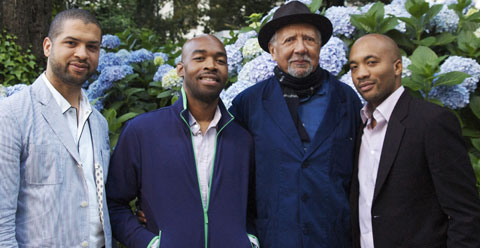
SEEKER Lloyd (second from right, with Jason Moran, Eric Harland, and Reuben Rogers) has had a career that’s embraced superstardom, reclusive spirituality, and indisputable jazz mastery.
|
"Whup, whup, whup, whup! Anybody there? Can you hear me?"
I had let the phone ring until the voicemail picked up and a woman's voice said, "We're not here right now." I'd left a message, then tried again, figuring I might have gotten the wrong number. But I hadn't.
"How come you didn't let the phone ring, man? What happened? We live in the country! We still love city life, but we're home from touring — we need to be relaxed. We just had a nice beautiful walk in the rain — after the rain, that is. Foggy. It's beautiful. What's up? Whatcha thinking about?"
The voice — a rolling, unhurried drawl with a laugh in it — is that of Charles Lloyd, 72 years old, saxophonist, early career star, temporary recluse, lifelong mystic seeker. Lloyd, who comes to the Regattabar with an all-star quartet January 21 and 22, is reputed to have recorded one of the first million-selling jazz LPs, Forest Flower: Charles Lloyd at Monterey (Atlantic, 1966), with Keith Jarrett, Jack DeJohnette, and Cecil McBee. In his crossover mode, he's recorded with, among others, the Beach Boys. After a period of huge success, he dropped out of the scene. But since the mid '80s, he's released one album after another, and that has gradually secured his position as one of the music's living masters.
His latest, Mirror, is his 14th for ECM since 1989 and his second with a quartet that's the equal of that first great one: pianist Jason Moran, bassist Reuben Rogers, and drummer Eric Harland. Heavily influenced early in his career by John Coltrane, Lloyd here indulges his Hindu mysticism with the album's closing "Tagi," which begins with a gentle, almost inaudible recitation from the Bhagavad Gita, his saxophone not entering until a good five minutes into the nine-minute piece. But there are also tributes to Monk ("Monk's Mood," "Ruby, My Dear"), the spirituals and blues that are a part of Lloyd's Memphis upbringing ("Go Down Moses," "The Water Is Wide," "Lift Every Voice and Sing"), a Lloyd original that has the sturdy chord changes of a ballad standard (the title track), a Mexican folk song ("La Llorona"), the Beach Boys' "Caroline, No," and the Sammy Cahn–Jule Styne American Songbook classic "I Fall in Love Too Easily."
That last one features tenor-saxophonist Lloyd making a rare appearance on alto, with just bass and piano, no drums. It's typical of the album's spare looseness. Despite moments of rhythmic intensity, Mirror is mostly a down-tempo, subdued affair. At this stage of the game, Lloyd can convey emotional fragility even at his most technically audacious — the long-breathed phrases, the rising burble of grace notes that lead into the first note of each phrase on "Ruby, My Dear." On "I Fall in Love Too Easily," with only Rogers's bass behind him, he leaps in registers and across keys for filigreed parenthetic asides before landing back perfectly in his previous train of thought.